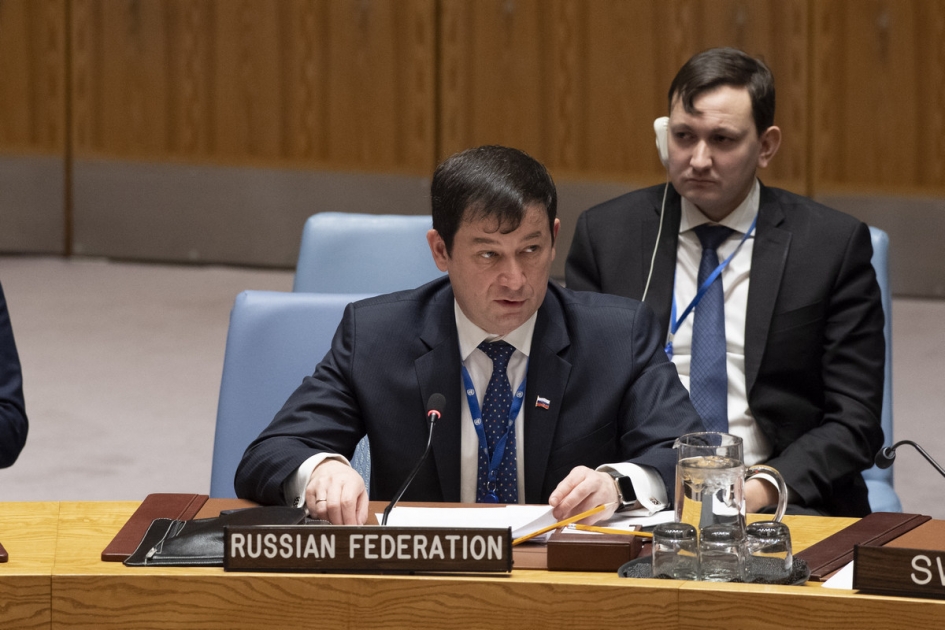Statement by Charge d'Affaires Dmitry Polyansky at the UNSC meeting on Peacebuilding and sustaining peace: Post-conflict reconstruction and peace, security and stability
We are pleased to welcome you, Mr. President, to the Security Council. First and foremost, I would like to echo the words of condolence that my colleagues have expressed to the American people and to the family and friends of the forty-first President of the United States of America, the late Mr. George Herbert Walker Bush. He served his country faithfully, first on the field of battle during the war years and then in high governmental positions.
Mr. Bush did much to strengthen Russian-American cooperation on matters of international security and earned sincere respect in my country. We thank you, Sir, for organizing today’s Security Council meeting on post-conflict peacebuilding, and we are grateful to the Secretary-General for his views and for his serious attention to peacebuilding issues. For many years United Nations peacebuilding assistance has been an important tool for helping States to deal with the consequences of conflicts.
As a rule, countries that have survived the hot phase of a crisis do not have the human and institutional resources to resolve the whole complex of problems facing them on the security, law-and-order and socioeconomic development fronts, as well as other pressing issues, which is why they may need international assistance. At that sensitive stage, the main tasks for a country are establishing national reconciliation and restoring safe living conditions for its population as a whole, as crucial conditions for preventing relapses into armed conflict and transitioning to sustainable development.
Many issues related to the early stages of peacebuilding are included in the mandates of United Nations peacekeeping operations. In fulfilling their main task of helping to advance peace processes, peacekeepers make an important contribution to establishing the initial conditions for the start of a fullfledged recovery. However, it should be understood that peacebuilding’s key efforts take place at the national level.
Those efforts do not consist in a short list of objectives but in a long process that begins before the drawdown of a United Nations mission and continues afterwards right up until all the goals have been successfully implemented. In that way it differs from international peacebuilding assistance, which is necessary only until the host State achieves selfsufficiency — that is, the ability to exist without critical support from the international community.
As we have seen in practice, the help that is provided during a conflict is not always effective, since it is often impossible to consolidate its positive results and the processes have to be started again from scratch in the event of a relapse into conflict. International peacebuilding assistance therefore gets results only when it is accompanied by a sustainable truce and a political process. While the primary responsibility for developing and implementing peacebuilding strategies unquestionably belongs to Governments, all national stakeholders should recognize their shared responsibility for peace.
It is difficult to conceive of effective post-conflict recovery, let alone development, without constructive contributions from all segments of society. As for international support, it should be based on the Security Council’s fundamental resolutions 1645 (2005) and 2282 (2016), which outline the basic principles of peacebuilding — the consent of host States, respect for its sovereignty and political independence, and the recognition of national ownership and leadership. Needless to say, international peacebuilding assistance should aim to enhance host States’ national capacity and independence, not act as a substitute for their functions.
With regard to the work of the United Nations in the area of peacebuilding, it is important to strengthen its internal coordination and maintain its division of labour in accordance with the existing mandates of the various Secretariat departments. In developing peacebuilding assistance programmes, it is important to bear in mind that each country’s situation is unique and each has its own reasons for where it has ended up. A one-size-fits-all approach simply will not work.
Every option for international peacebuilding assistance must have the unconditional support of the host State or risk exacerbating existing problems. The key role in coordinating peacebuilding assistance belongs to the Peacebuilding Commission. That intergovernmental advisory body’s potential has still not been fully realized. It would be particularly helpful to the Security Council to have information about the national peacebuilding priorities of States whose situations are on both bodies’ agendas.
The transmission of that information and the Commission’s unanimous advice could be an excellent complement to the Secretary-General’s reports without duplicating them. That would be especially helpful during the transition from the peacekeeping to the peacebuilding stage, or when the Council reviews missions with a view to increasing their cost effectiveness. Needless to say, where financing United Nations peacebuilding assistance is concerned, an increase in predictability would not go amiss.
We believe that the best way to encourage Member States to make voluntary contributions is by ensuring proper transparency and accountability in the use of the funds provided. In conclusion, I would like to emphasize that we firmly believe that only an impartial and transparent approach to peacebuilding and sustaining peace can ensure the effectiveness of efforts in this area.
It is important to provide that assistance in support of the efforts of host States themselves without imposing ready-made solutions or unnecessary mentoring. The main purpose of peacebuilding is to help States get back on their feet as soon as possible and manage their sustainable development issues independently.
